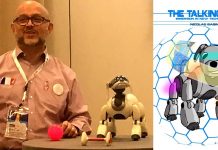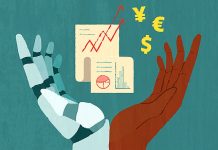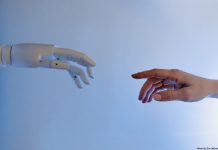I wanted today to broadcast in English this excellent article, originally published in French by FIGAROVOX with Laurent Alexandre, on transhumanism, artificial intelligence, robots, and the “dark” vision of Elon Musk on our future.
Will “Gattaca” really become the norm?
Even if I don’t agree with the pessimist point of view on the supposed AI nightmare coming, this interview is really interesting to better understand the challenges that we are going to face in the next 20 years and over.
From my point of view, humans will only decide of their future … decisions that could be the most crucial since the beginning of humanity … to move towards a better life thanks to technological progress related to artificial intelligence … or to go to … Gattaca!
——————————————————————————————————
FIGAROVOX / GREAT INTERVIEW – Should we be afraid of transhumanism?
Between fantasies and reality, Laurent Alexandre answers all the questions we ask ourselves about artificial intelligence. He paints a vertiginous and disturbing portrait of the world to come, where technologies will radically transform the human.
Laurent Alexandre is a surgeon-urologist and co-founder of Doctissimo, popular French healthcare website. He is very interested in the issues of transhumanism. He published « Are Robots Making Love?: Transhumanism in 12 Questions » (Dunod, 2016).
——————————————————————————————————
FIGAROVOX. – The power of the GAFA on the world (financial power, digital) maintains fantasies and concerns. Is this power real and how can it dominate the old nation-states?
Laurent ALEXANDRE. – Yes, the GAFA and tomorrow the Chinese BATX (Baidu, Alibaba, Tencent, Xiaomi) are the new masters of the world. Europe only knows how to whine. She missed the digital revolution. No operator, be it GAFA or BATX, comes from our continent. After such a failure, such a lack of vision we could hope that Europe gets to work to catch up. In fact, Europeans prefer to whine and accuse the digital giants of all ills. This infantile reflex will lead nowhere. The GAFA must certainly pay taxes in Europe, but the main issue is elsewhere: we must try to create digital platforms. This will be very difficult because we have inadequate regulations: we have the CNIL [Editor’s note: a French public office that works for protecting citiczen’s rights and privacy in the digital ecosystem], they have the GAFA.

The CNIL is remarkable but there are 27 in Europe …. which is heavy to internationalize.
Moreover, most of the rules do not emanate from parliaments but from digital platforms. In addition, Artificial Intelligence systems are very difficult to auditing: the weights and behaviors of different virtual neurons-often close to a billion-change every millisecond, as our biological neurons change their behavior according to their experience and environment. The public power has not taken the measure of the current revolution: the law will have to reinvent itself to frame the AI and therefore our life. The governance, regulation and police of AI platforms will become the core of parliamentary work. Unlike traditional algorithms that have few branches and are printable, evaluable and auditable, an AI is too complex to be analyzed by traditional methods. The complete documentation of a deep learning AI algorithm would make billions of billions of billions of pages …. and will be obsolete just few moments later.

Parliament will have to reinvent itself and a parliamentarian who does not master the IA – or who still thinks that AI is a common computer program – will become a public danger, a machine to fan populism because it will not no hold on the real. Parliament must modernize to become a bulwark against the populist impulses of which we have seen only the premises, to play the role of buffer between popular aspirations and the political impossibility of satisfying infinite demands. This presupposes that parliamentarians understand that the real law is produced by the AI of digital giants, that their role is to supervise them and that a good parliamentarian must have a good technological culture.
Artificial intelligence is already in our lives through the technological tools. How far can its influence extend?
Everywhere including in our brains: Musk understood everything. March 28, 2017 marks the beginning of the fusion between biological brains and artificial intelligence (AI). Elon Musk, the world’s largest media maker, founder of PayPal, Tesla, SolarCity, Hyperloop, The Boring Company and SpaceX, has announced on Twitter the launch of Neuralink, a company designed to increase brain capacity with tiny components interlaced between our 83 billion neurons, which would turn us into cyborgs. Elon Musk is giving himself five years to release the first Neuralink prototypes. This race for neuro-enhancement (brain augmentation) is motivated by its obsession with a man’s surpassing AI, which would turn us into domestic animals at best. He believes that the worldwide ban on AI is illusory, even though he created Open AI, a structure designed to oversee, monitor and police AI.
“We will make machines that reason, think, and do things better than we can,” said Sergey Brin, the co-founder of Google two years ago; he confessed this year in Davos that he had underestimated the AI revolution. Musk is also angry with Google’s Larry Page, who blames him for taking the risk of being the factory of a hostile AI at any time, even if he does not realize it.
Elon Musk is very much influenced by Nick Bostrom, the hostile AI theorist, who argues that there can only be one intelligent species (biological or artificial) in a region of the Universe: the modern version of the popular wisdom that there can not be two crocodiles in the same swamp. Having as primary objective its survival, any strong IA will protect itself by hiding its aggressive intentions and by preemptively attacking. The increase of our intellectual capacities seems to Elon Musk the only solution, with the development of colonies on Mars, to prevent that the whole humanity is exterminated at once.
How does brain augmentation work?
Cerebral augmentation can only be done in two ways: by selection and genetic manipulation of embryos, or by electronic action on our brain.
Musk refuses to touch the DNA; all that remains is the intracerebral implants. This project provokes mockery on the part of many neuroscientists, who consider it unrealistic but forget that Musk always delivers what he promises; the second is Musk can mobilize considerable resources and recruit the world’s best paid experts at a high price.
The revolutionary projects of Elon Musk pose many political questions. Would it be ethical not to increase the cognitive abilities of the less talented? Will these implants increase everyone’s IQ in a homogenous way, or will the most intelligent people benefit de facto from a higher gain, which would create an ultra-inegalitarian world? Neurotechnologies will upset our institutions: we are on the eve of a school revolution whose role will become programming, under the control of the CNIL, brain prostheses. Faced with these issues, the discourses on education are a succession of clichés that seem well at ease when brain manipulations made in California.
What is the limit between augmented man and simple medical repair?
The field of increase is wide. Vaccinations, sunglasses, sunscreen or contraceptive pills are increases. We are already growing to prevent diseases or to control our biological destiny. But we will soon go much further. Tomorrow the increase will take many forms. The embryonic selection in a slightly more sophisticated form than « Gattaca » [Editor’s note: a sci-fi film describing a perfect world where people all have an impeccable genetic heritage] will become the norm. It’s not my personal wish but a prognosis.
And we will accept neurotechnological prostheses to avoid being overtaken by the AI or by our neighbors who would have accepted for example the implants that Musk is in the process of developing.
Can we live 300 years?
The 300-year threshold is meaningless. In reality, the human species will become immortal. In 100 years or 500 or 1000 years. It does not matter. The real question is the price. The Faustian pact with technology is fraught with consequences. We will not become immortal without major changes in our humanity. The death of death is only one step: the transhumanists want to make the universe eternal. The first to understand this was Charles Darwin. He explained that if the universe were to die, the human adventure would have no meaning since all his creations would disappear. What is the meaning of our lives, if all trace of our civilization disappears with the death of the Universe? What is the ultimate goal of humanity, of science?
For Clement Vidal, the answer to this last question is clear: the ultimate goal of science is to fight the death of the universe, through the artificial creation of new universes. After the death of death, science would be dedicated to fighting the death of the Universe. Artificial cosmogenesis would mobilize all the energy of humanity in the next billion years. After the regeneration of our aging organisms, cosmological regeneration would aim to make the Universe immortal or substitutable.
The digital economy is based only on intelligence and abstraction. Will it make us men above ground?
Th is is a major issue. It will be necessary to fight to keep a body and not to become cyborgs even AIs devoid of material. The first issue is to save our body, with all the defects and all the constraints that it involves. Some transhumanists have imagined that it would be great to break free. When it becomes possible, we will realize that this bundle of bones, blood and muscles, this precarious heap of organs that is always more or less dysfunctional, this miserable, despised envelope is in fact our ultimate root. To give up on her would be to give up on us. With other authors, Teilhard de Chardin introduced in 1922 the term “noosphere” to designate the third phase of development of the earth, after the geosphere – inanimate matter – and the biosphere – biological life. This neologism means “sphere of human thought”. The future world described by Teilhard is this neurotechnological fusion where the body gradually disappears. I am convinced that the rescue of our body constitutes one of the three essential pillars of our humanity is, with the maintenance of the right to disconnect from the matrix and the maintenance of a part of genetic chance.
is is a major issue. It will be necessary to fight to keep a body and not to become cyborgs even AIs devoid of material. The first issue is to save our body, with all the defects and all the constraints that it involves. Some transhumanists have imagined that it would be great to break free. When it becomes possible, we will realize that this bundle of bones, blood and muscles, this precarious heap of organs that is always more or less dysfunctional, this miserable, despised envelope is in fact our ultimate root. To give up on her would be to give up on us. With other authors, Teilhard de Chardin introduced in 1922 the term “noosphere” to designate the third phase of development of the earth, after the geosphere – inanimate matter – and the biosphere – biological life. This neologism means “sphere of human thought”. The future world described by Teilhard is this neurotechnological fusion where the body gradually disappears. I am convinced that the rescue of our body constitutes one of the three essential pillars of our humanity is, with the maintenance of the right to disconnect from the matrix and the maintenance of a part of genetic chance.
Can the domination of intelligence lead to a selection of humans according to their IQ, eugenics?
That seems to me inevitable and I regret that there is no debate on these subjects. It’s hard not to see where the eugenic toboggan leads: parents want the best for children and want to give them every chance in life – how do you blame them? They may be inclined to choose the size, eye color and hair of their children. But even more, they will demand what has a decisive role in social success: a strong IQ. As soon as this is possible and accessible, the demand for improved intelligence for future children will explode. According to a survey conducted in 2016, 50% of educated young Chinese wish to increase the IQ of their future baby … A percentage of membership that will skyrocket … as soon as parents will realize that the children of their neighbors have all 50 IQ points more than theirs …
A study conducted by Shulman and Borstrom in 2013 showed that embryo selection gave significant results. Rapid progress can be seen. Within 5 to 10 years, embryo selection techniques may allow, if desired, a certain increase in the cognitive abilities of individuals thus “produced”. But this increase will remain limited, and will not exceed the collective increases in IQ that have been observed in the past, because of a more stimulating environment overall – the Flynn effect mentioned earlier in this book.
Nevertheless, show Shulman and Borstrom, it is possible to go much further in efficiency. The use of human stem cells of gametes makes it possible to carry out an iterative – repeated selection – of embryos in vitro. The cognitive effect could become much more significant over several generations.
How to maintain the democratic principle “a man, a voice”, if the differences of intelligence are accentuated?
We will not save democracy if we do not reduce IQ differences. Augmented people with 180 IQs will not ask for my opinion any more than I think of giving chimpanzees the right to vote.

It will be necessary to speak IQ which is not easy to be politically hot. Make no mistake: the taboo of IQ reflects the unconscious and unspeakable desire of intellectual elites to keep the monopoly of intelligence at a time when it is politically and morally unacceptable
Man is not reduced to his brain. He is also sensitivity and inner life. Are these two dimensions threatened?
In my opinion, you wrongly think that man is reduced to his brain. We are our brain. The inner life is a production of our brain. The Church still refuses the idea that the soul is produced by our neurons, but it will soon accept it as it acknowledged in 2003 that Darwin was right, 150 years after the pope declared that Darwin was the finger of the devil. It is also essential, if Christians want to participate in the neurotechnological debates that are key in our future. How far does our brain grow with Elon Musk’s intracerebral implants? How far do we merge neuron and transistor? What right is given to machines? The emergence of new intelligent biological or electronic creatures has religious consequences: some theologians, such as Reverend Christopher Benek, want intelligent machines to be able to receive baptism if they wish to do so. The NBICs pose new questions that engage the future of humanity.
Can we finally speak of a “dictatorship of intelligence?”
Intelligence in a digital society is the key to all political and economic power. We created a knowledge society without thinking about the consequences. We built a knowledge-based economy, without understanding that we would give an enormous advantage to people who master data, endowed with brain plasticity that allows them to change jobs regularly and to train themselves for life: all qualities that are measured by IQ. An additional IQ point will make more and more difference in the knowledge society. We should rename the IQ and call it QCIA, the Quotient of Complementarity with Artificial Intelligence, to remove its stigmatizing character. Starting in 2020, the minimum IQ to have a job will increase by 5 to 10 points per decade. So, the modernization of the school must be started to enable children to remain competitive with AI. There is a complete desynchronization between our institutions – including the school, which forms the trades of yesterday – and the technology that gallops. The school sends the children of the popular classes where the AI will roll them and ignores the formations where they would be complementary and thus protected. On the contrary, we must constantly map the technological frontier to constantly adapt the educational system to the progress of AI and act on all levers to increase the cognitive capacity of the population, since in the future almost all inequalities will be linked to cognitive abilities. The frantic race of the IA is a huge challenge for our civilization.
Original article in French Language is there: http://www.lefigaro.fr/vox/societe/2017/06/02/31003-20170602ARTFIG00207-laurent-alexandre-bienvenue-a-gatacca-deviendra-la-norme.php







![The Incredible Growth of Fintech [Infographic]](http://ipfconline.fr/blog/wp-content/uploads/2018/02/31-01-2018-growth-of-fintech-1-218x150.jpg)
![FINE LIST OF 50 TOP WORLD BIG DATA EXPERTS TO FOLLOW IN 2017 [WITH MOZ SOCIAL SCORE]](http://ipfconline.fr/blog/wp-content/uploads/2017/05/Capture0000001ALTERN-218x150.jpg)

![FINE LIST OF 30 TOP WORLD INSURTECH EXPERTS TO FOLLOW IN 2017 [WITH MOZ SOCIAL SCORE]](http://ipfconline.fr/blog/wp-content/uploads/2017/05/hgfhfh1-218x150.jpg)













